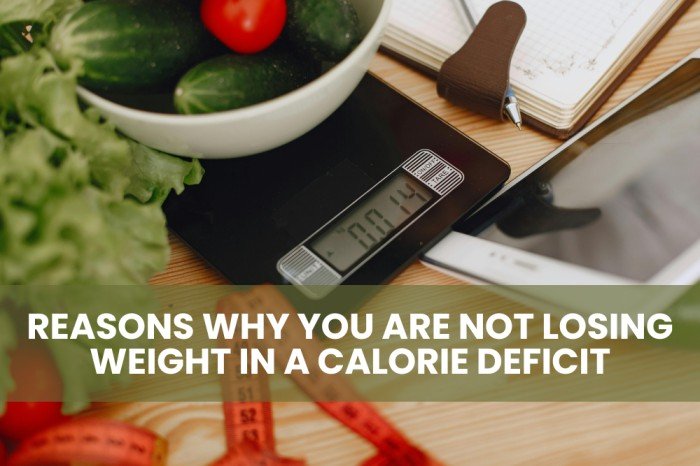Losing weight appears to be a very simple task on the face of it. But when you focus on weight loss management, you understand how difficult it can tend to be. The scale refuses to budge despite your attempts.
Frustrating? Well, you aren’t alone. There are several reasons why you are not losing weight in a calorie deficit.
These Mistakes Could Be Blocking Your Weight Loss Goals
Well, let us now find the specific reasons why you aren’t losing weight despite a calorie-deficient diet.
You May Not Be Tracking Calories Accurately.
You may underestimate how many calories you had. What you may think is harmless may invariably increase the calorie intake without you realizing it.
Some common mistakes can include
- Miscalculating the food portions
- Ignoring the hidden calories, like those in sauces and beverages
- Using outdated or inaccurate food catalogues
Smart tip – Use a digital kitchen scale and a reputable food-tracking app. Track everything, even “small” snacks or licks of a spoon.
Water Retention
You may be facing water retention issues. This can typically happen due to constipation, bloating, or hormonal reasons. It can mask the fat loss even if you have a considerable fat loss.
Here are a few solutions that can be helpful –
- Stay hydrated
- Eat fiber-rich foods
- Monitor weight fluctuations weekly rather than daily
Too Many Restrictions
You may be too restrictive with respect to food habits. This can create frustration, which can lead to binge eating. It can disrupt your weight management progress or even slow down your metabolism.
Practice sustainable habits. Incorporate foods you love in moderation and aim for lifestyle changes, not quick fixes. Go slow with your low-calorie deficit food. Give your body enough time to adjust to the food regimen.
Not Getting Enough Sleep.
Chronic stress releases cortisol. This can promote fat retention and other issues. You may notice fat retention specifically around your belly. Poor sleep cycles can also result in hormonal imbalances. This can lead to weight retention or even weight gain.
Look for these solutions to address the issue –
- Aim for 7–9 hours of quality sleep per night.
- Practice mindfulness, meditation, or yoga to manage stress.
Not Eating Enough Protein
If you are on a weight loss regimen, it is essential to eat enough protein. This will help you preserve lean muscles. If your calorie deficit is composed mainly of carbs and fats, hunger can spike, leading to overeating.
Here are a few tips that can be helpful –
- Include a source of lean protein in every meal—chicken, tofu, eggs, lentils, or Greek yogurt are excellent choices.
You Are Under A Medical Condition
A few medical and hormonal conditions can leave you gaining weight or make you retain fat. A few of these issues can include hypothyroidism, PCOS, insulin resistance, or menopause. In such conditions, it may be much more difficult to lose weight even when you are on a calorie deficit.
If you’re doing everything right but still not seeing progress, it’s wise to consult a healthcare provider. Blood tests and a full health assessment may reveal underlying conditions.
Maybe You Are Losing Fat, But Gaining Muscles
The scales may not tell you the exact story of your weight loss journey. If you are into activities like weight lifting and resistance training, you may be gaining muscle. Even when you are losing fat, the scales may not show it.
You may check out the following options –
- Track progress using photos, measurements, or how your clothes fit—not just the scale.
- Celebrate non-scale victories like increased strength and energy.
Eating Processed Food As Healthy Food
Studies have indicated that eating processed food can be one of the primary reasons for overweight or obesity. If you are too dependent on overly processed food, proper weight management may be very challenging.
If you have severe food cravings or have a severe dependency on processed food, it is advisable to seek professional help. Our Nutritionist at STEPS Clinic can help you plan your journey more effectively.
Drinking Too Much Alcohol
Alcohol is a powerhouse of empty calories. They do not offer any nutritional value or other benefits. Of course, it is quite common to lose track of liquid calories. But they do contribute to weight gain.
Count each of the drinks, and add them to your calorie intake. You can also try making a change to low-calorie drinks. Limiting your alcohol intake should be the best technique to ensure better weight loss management.
Ignoring Exercises
Calorie-deficient diet alone may not yield the necessary results in weight management. You should combine it with exercises. Diet, exercise, and lifestyle modifications go hand in hand when it comes to managing your weight.
Focus on consistency and variety in workouts. Don’t rely on exercise alone for creating a calorie deficit—it’s just one part of the puzzle.
Stuck In A Calorie Deficit? Get a Customized Diet Plan
Weight loss is not linear, and it’s influenced by numerous physical, mental, and emotional factors. If you’re not losing weight in a calorie deficit, it doesn’t mean you’re failing—it means it’s time to reassess and adjust.
At STEPS Clinic, we understand that weight loss isn’t a one-size-fits-all journey. Our team of experienced professionals helps you identify the root causes behind stalled weight loss, offering tailored programs that address nutrition, exercise, medical conditions, and lifestyle factors. Whether you’re struggling with a plateau or seeking a sustainable path to better health, we’re here to guide you—step by step. Contact us for expert help in your journey.

